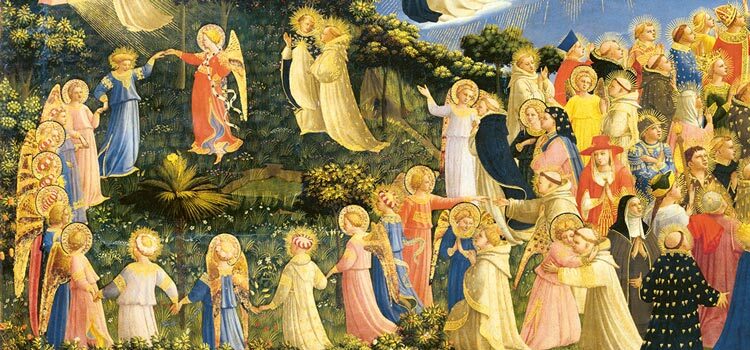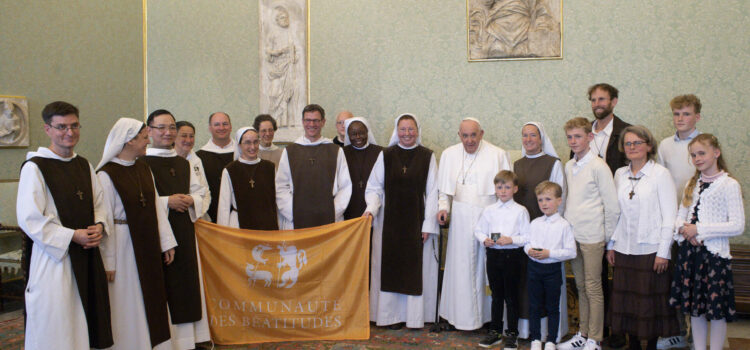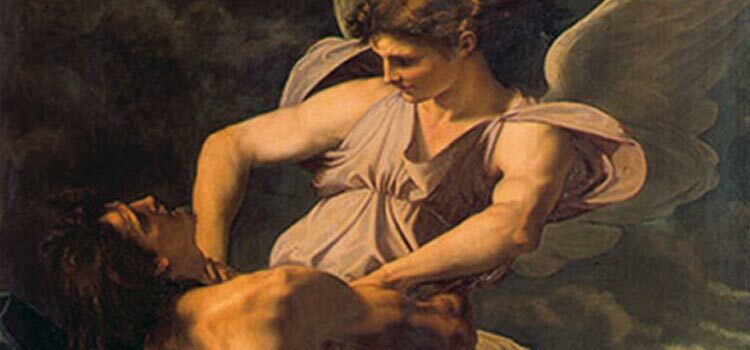During teachings on prayer, this question is often asked : What is the difference between orison and adoration ? These are two distinct realities, but they can sometimes coincide .
Orison is something broader. It is, to quote the famous expression of Teresa of Avila, this « friendly intercourse in which we talk frequently and intimately with the One whom we know loves us ». It is that form of prayer, personal, silent, in which one expresses and deepens an intimate relatioinship with God. It can be experienced in the most diverse places (even if it is made easier by places allowing for silence and recollection). It includes very diversified inner acts or attitudes : outpouring of the heart before God, supplication, giving thanks, listening, meditation, contemplation, etc.
Adoration, on the other hand, is one of the most fundamental human dispositions in a relationship with God, either in silent orison or in other forms of personal or community prayer. The starting point is a gesture : that of genuflection, of prostration as a mark of respect and submission : “Come, let us bow down in worship, let us kneel before the Lord who made us ; for he is our God; we are the people of his pasture, the flock under his care, ”says Psalm 95.God as all of Scripture forcefully proclaims strongly « God only you will adore ». Woe to the man who adores something other than God, he will eventually find death and ruin. On the contrary, happy is he who knows how to kneel before God, he will be able to stand up before men and face all the storms of life.
This gesture of adoration must, of course, express an inner attitude, already present in the Old Testament, and which Jesus evokes in his dialogue with the Samaritan woman as a grace of the new times, a gift of the Spirit : ” The time is coming – and has now come – when true worshipers will worship the Father in spirit and in truth: such are the worshipers that the Father seeks. God is spirit, and those who worship him must worship him in spirit and truth” (Jn 4: 24).
Adoration is the attitude of man who perceives his fragility and littleness and, at the same time, the immensity and the infinite greatness of God. It is a paradoxical attitude, made of both happiness and fear. Man is dumbfounded, reduced to nothing by the perception of divine greatness, but at the same time, he is very happy to be faced with something which infinitely surpasses him and whose beauty and majesty fascinate him. He finds a deep joy to have something to admire and love, that surpasses all understanding and all beauty. Something given to him for free and which is far greater and more splendid than the work of his hands.
Gesture of Adoration
The primary gesture of adoration is prosternation, but there are also other gestures to express it, such as the praise of the lips, which must express that which dwells in the heart. It is interesting to note that, in the Scriptures, « pure lips » are those who invoke and praise the Lord while those who address idols are « unclean ». The deeper the adoration, simpler do the words become, like a brief « Praise be to You » or « My Lord and My God » or a simple agreement : « Amen ! » In fact to adore is to consent. It’s letting God be God » says Cardinal Cantalamessa.
We find the etymological meaning of the word « adore » in Latin languages : ad orare from the Latin os (mouth) which litteraly means « to lift up to the mouth » « to kiss » It is touching to note this : to adore is to stand humbly before a majesty that is infinitely beyond us, but which we can nevertheless approach, which allows itself to be encountered which we can not only venerate but also love, and which can moreover become food for us. A kiss expresses the desire to feed on the other. To adore is to feed on God. You can put your hand on your mouth to send a kiss but also to invite the lips to keep silent. This is exactly what Job says, at the end of his experience : « Behold, I am unworthy, how can I reply to you ? I lay my hand over my mouth » (Job 40,4)
All told, the highest act of adoration is silence. The closer we get to God, the more words become scarce because we feel how powerless they are to express a mystery that only silence can truly honor.
Adoration is a great blessing for man. If he bows down before God, acknowledges his littleness, he will be lifted up, glorified. In adoration, man realises the deepest and most beautiful abilities of his nature. Man finds a certain greatness in acting, transforming what is real, but he finds a much higher glory in welcoming something that infinitely surpasses him, in admiring and contemplating the immense beauty that is offered to him. That is what he was created for, and therein is his greatest happiness.
Eucharistic Adoration
A place where orison and adoration very often come together is during Eucharistic adoration. Maybe it is a special gift reserved by the Lord for the end of the time, because of the growing need to nourish and strengthen oneself from the Eucharistic presence in times of great confusion and difficult battles as at present. Of course, we must be able to pray everywhere, to dialogue intimately with God in nature, in a train, even in the midst of a crowd. But Eucharistic adoration has gradually taken, and will have a more and more privileged place in the piety of the Church.
Even if we sometimes experience a certain poverty and aridity, Eucharistic adoration is always a grace for those who adore, a source of life for the whole Church, a way of hastening the coming of the Kingdom for the whole world. When we are deprived of all personal satisfaction in prayer, we must be content to be like a candle, which is consumed for free in the presence of God. Paradoxically, nothing is more fruitful than this poverty accepted and offered, in the presence of the God of glory who made himself so poor for us.
Quote from Patty Mansfield testifying to the experience of young people at Duquesne University where Catholic Charismatic Renewal began in 1967, during Eucharistic adoration:
« The fear of the Lord began to flow among us ; a sort of sacred terror kept us from looking up. He was personally present and we feared that we could not resist his immense love. We loved it, finding out for the first time what worshiping meant. We had the burning experience of how terribly real the presence of the Lord was. Since then we have understood with new and direct clarity the images of the Lord who, on Mount Sinai, thunders and explodes with the fire of his very being ; we understood the experience of Isaiah and the claim that our God is a consuming fire. This sacred fear was sort of the same as love, or at least we felt it that way. It was something extremely lovable and beautiful, although none of us saw a sensitive image. It was as if the personal reality of God, splendid and dazzling, had entered the room and filled the place and all of us »
Quotation
« Adoration is the perception of the greatness, the majesty, the beauty, and at the same time, the goodness of God and his breathtaking presence. It is a sort of shipwreck in the landless and bottomless ocean of the majesty of God. To adore, according to the expression of Saint Angela of Foligno, means « to recollect oneself in unity and immerse oneself in the infinite abyss of God » Cardinal Raniero Cantalamessa
To go further…Just for today
Readings
|
Find the previous articles in our “Life of prayer” series.
(publication edited by brothers and sisters of the Community of the Beatitudes – © rights reserved).






